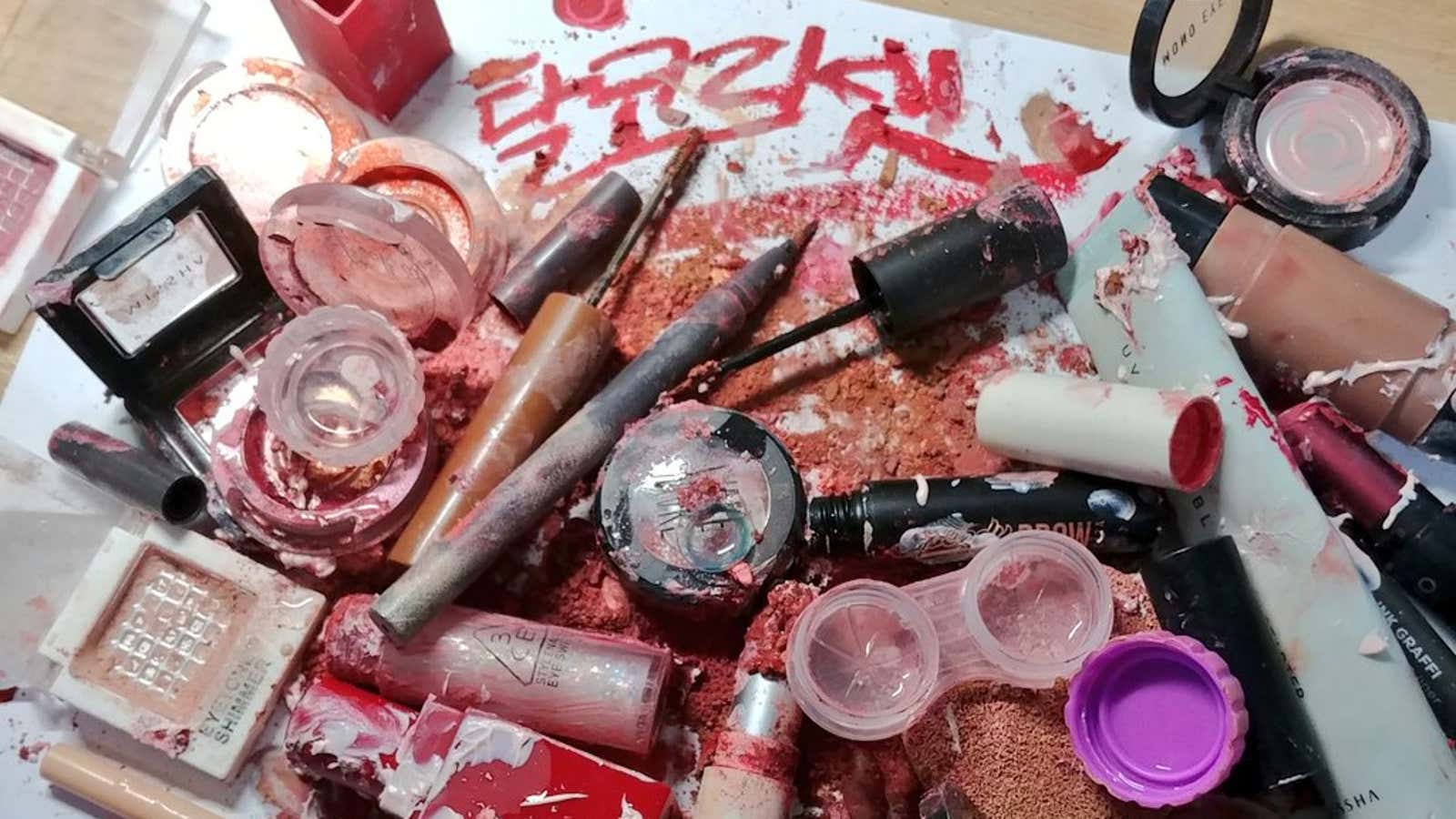They are scenes of beautiful destruction—often to the tune of many hundreds of dollars. South Korean women are trashing makeup collections accumulated over months, or even years, and then posting the results online. Iridescent eye shadow is pulverized into glittery dust, peachy nail polish emptied out onto pieces of white paper, and lipstick crushed into crimson smears.
Dozens of these photographs have been posted on social media platforms, as part of a South Korean feminist movement nicknamed “escape the corset.” Young women are rebelling against the strict beauty standards that have become their country’s norm. They’re chucking out their cosmetics and skincare products, replacing complex gels and peels with unscented moisturizers and lip balms, and adopting short, wash-and-go haircuts. “One theme running through the movement is the idea of a beauty regimen as a form of labour,” reports Benjamin Haas, in the Guardian, “one that only women are expected to perform and for which they are in no way compensated.”
South Korea, the world’s eighth largest cosmetics market, accounts for nearly 3% of global sales. It’s the country responsible for BB and CC creams, skincare involving snail slime and donkey milk. Women are urged to pursue a dewy, “pore-less” look, achieved by rigorous skincare regimens and carefully applied make-up. Between 2012 and 2017, the market grew annually by over 7%. Now the tide may be turning, with women frustrated by the unpaid labor represented by having to make themselves up every day. And it’s not just a time cost: These ruined collections represent tremendous financial investment. Just one MAC lipstick retails for 30,000 won ($26)—about four times the hourly minimum wage.
Cha Ji-won, a Korean woman interviewed by the Guardian, reported that she was spending as much as 100,000 won ($88) each month on cosmetics. Not anymore: “There’s only so much mental energy a person has each day, and I used to spend so much of it worrying about being ‘pretty’.”
Another woman’s makeup collection once seemed like “meaningful consumption,” she writes. “Now, it’s just garbage.” Without it, she wonders, “how will I spend my money?”
This woman wore makeup daily from junior high, reapplying lipstick every hour. Now, she’s throwing it, and “the corset,” away:
“I liked pretty things. I wanted to be pretty. I hated my ugly face,” this woman writes. “I didn’t go to school on days when my make-up didn’t look good.” Now, she says, she realizes that she doesn’t have to be pretty. “I took off the mask that was ruining my life.”
“I was embarrassed to go outside if I didn’t have makeup on.”
Seeing the combination of all these lotions and potions, this woman writes, “I wonder how I was putting this on my face.”
The “escape the corset” movement didn’t come out of nowhere. Instead, it’s just one part of a feminist revolution that has swept the country in the wake of its #MeToo movement. In January, public prosecutor Seo Ji-hyeon accused a former high-profile politician of groping her at a funeral in 2010. In the months since, hundreds more women have come forward with their own stories of assault and harassment. A 22,000-strong Women’s March for Justice in Seoul in June became the largest feminist rally in the country’s history.
These shifting principles are filtering out into how women spend their time and their money, in a country in which a premium has long been placed on beauty. Plastic surgery is a common graduation present, while photos are a normal feature of job applications.
It’s still too early to say whether the movement has begun to affect cosmetics companies’ bottom line, let alone whether it will bring about substantive cultural change. But local media reports say some cosmetics retailers are already working out how to reposition themselves in this new, feminist market. Rather than playing on women’s insecurities, they’ll be targeting male customers more aggressively, instead.
